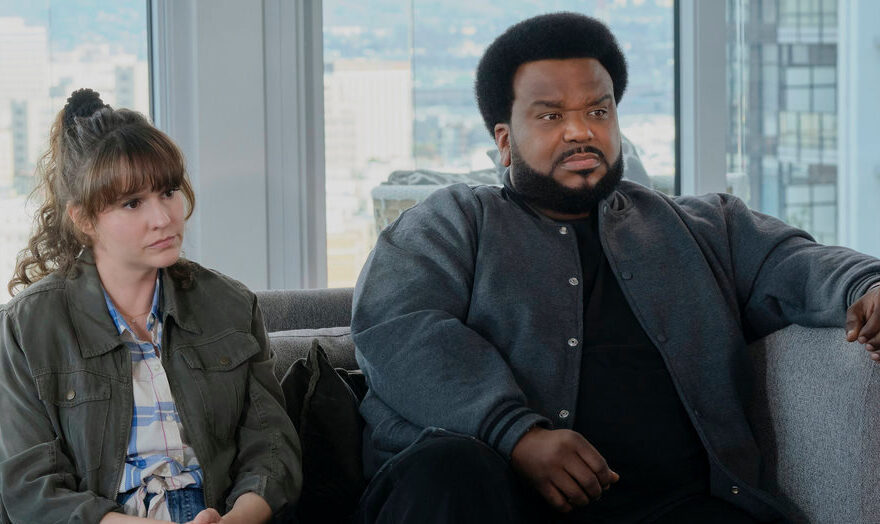In the return of this scathing satire on Peacock, the economy is a swamp full of predators and prey.
By James Poniewozik
It is tempting to say that “Killing It,” on Peacock, is a satire of dog-eat-dog capitalism. But that would be an understatement. There’s also plenty of human-kill-snake capitalism. And snake-eat-human. And shark-eat-human. And giant snail — well, let’s not get ahead of ourselves.
Few comedies use wild animals as much or as well as “Killing It,” which returns for a second season on Thursday. But the critters’ relevance is more than zoological. In the running allegory of this scathing, slapstick sendup of the American dream, the road to riches — or simple economic security — runs through a feral ecosystem of predators and prey.
In the first season, Craig Foster (Craig Robinson), a Florida security guard, enters a snake-killing contest intended to control the spread of invasive pythons in the Everglades. Partnering with Jillian Glopp (Claudia O’Doherty), a stubbornly upbeat ride-share driver, he seeks out the $20,000 prize to finance his dream: farming saw palmetto berries to turn into prostate supplements.
Craig and Jillian encounter competitors and obstacles including Brock (Scott MacArthur), a self-proclaimed wildlife expert and aspiring YouTube star, and Rodney Lamonca (Tim Heidecker), a sleazy motivational speaker fleecing wannabe tycoons. This is the economy: You’re either offing snakes or selling snake oil.
The first season, set amid the frenzy of the 2016 election, was one of the surprise treats of 2022 TV, a sneakily incisive commentary on the gospel of the hustle. (If you didn’t watch it — and the show’s undeserved lack of buzz suggests you didn’t — stream it before starting the new one. It’s 10 quick episodes, and you’ll want to be up to speed on the serialized story.)
Season 2 drops the snakes but expands the show’s scope, leaning into the question of whether it’s possible to make a dream come true without moral compromise. Craig has started his saw palmetto farm with Jillian, only to see the first crop threatened by another invasive swamp thing, the giant African land snail. (It’s real, and it’s — ugh.)
The struggle to save the farm deepens the partnership between Craig, softhearted but realistic, and Jillian, the persistent Jiminy Cricket on his shoulder. (O’Doherty is giving one of TV’s best current comedy performances.) And it draws in new adversaries: the Boones, a family of small-time crooks who operate out of a local strip club and keep an alligator as an enforcer.
Dot-Marie Jones is a standout as the hard-bitten matriarch, Jackie, whose ambitions in horning in on the farm’s business are surprisingly modest: to get her extended clan health insurance. (The squabbling, larcenous Boones at times make the season feel like more of a sequel to “Justified” than the actual “Justified” sequel, “City Primeval.”)
This is not the Florida of sex, sun and South Beach but rather a desperate swamp full of monsters and hustlers. “Killing It” shares a low-rent vibe with series like the late, raunchy “Florida Girls,” whose Melanie Field steals scenes as Craig and Jillian’s domineering assistant, Shayla. The nonstop Florida jokes paint the state as a tacky anything-goes zone of scams and lax regulation; at one point, Craig is threatened with “the largest fine the state of Florida can levy against a corporation”: $50.
Left to bootstrap themselves up, its characters warp their identities and rent themselves out to stay afloat. One subplot involves an exploitative agency for Pitbull impersonators; in another, Craig’s ex-wife becomes a pregnancy surrogate for a dubious rich couple.
All this makes for a season even darker than the snake-slaughtering first. But this isn’t one of those moody, barely-a-comedy dramedies; it’s gut-bustingly, grotesquely funny. It’s also well plotted for such a broad comedy, though at times it feels as if it were trying to shove too much story into eight episodes, two fewer than the first season. A story line fleshing out Craig’s wayward brother, Isaiah (Rell Battle), is welcome but gets a little lost in the mix.
There’s little golden opportunity in the Sunshine State of “Killing It,” yet the show is not without optimism. Jillian in particular buoys the series with her relentless conscience and modest dreams; she’s happy just to put a down payment on a new Kia (which she names “Mallory”), replacing her old beater that towed a billboard and smelled “like that iguana that died in the engine.”
And there’s a pot of gold on the horizon, as established by a framing device in which a future Craig, now wildly rich, tells the story of his success. The question, heightened in Season 2, is how much of his soul he had to give up on the way there.
But as caustic as “Killing It” can be about the myth of self-made success, and as brutally as it makes fun of Florida, it also has empathy for the desire to make a dream grow from the muck of an inhospitable swamp. Under the right circumstances, it suggests, all of us are Everglades pythons, invasive species seeking ecological niches to exploit and make our own. As Isaiah says in Season 1, it’s “snakes all the way down.”
James Poniewozik is The Times’s chief television critic. He writes reviews and essays with an emphasis on television as it reflects a changing culture and politics. He is also the author of “Audience of One: Donald Trump, Television and the Fracturing of America.” More about James Poniewozik
Site Index
Site Information Navigation
Source: Read Full Article


